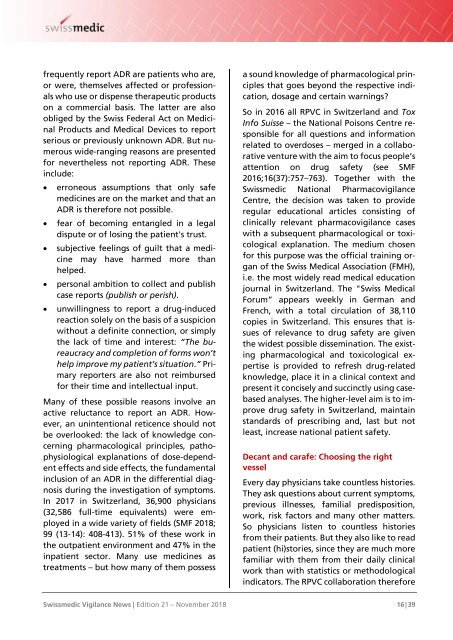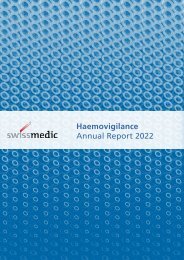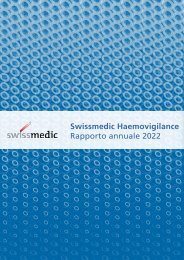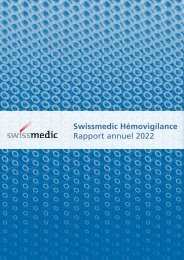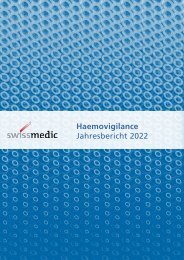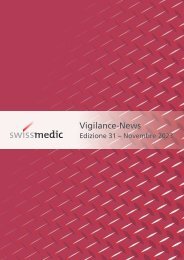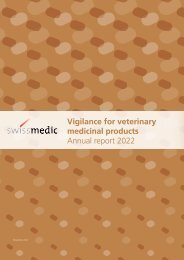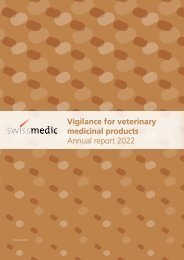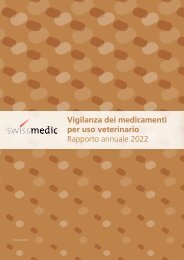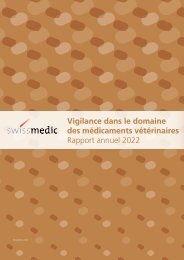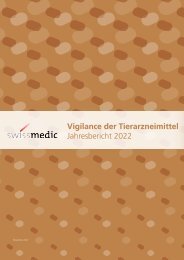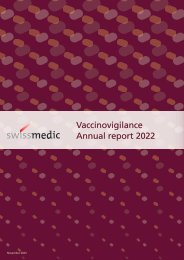Swissmedic Vigilance News Edition 21 – November 2018
In this edition: Isotretinoin and DOAC – Updates Confusion between amphotericin B formulations Guest articles: RPVC Zurich and RPVC Ticino Quality Assurance in Transfusion Practice Statistical Review 2017
In this edition:
Isotretinoin and DOAC – Updates
Confusion between amphotericin B formulations
Guest articles: RPVC Zurich and RPVC Ticino
Quality Assurance in Transfusion Practice
Statistical Review 2017
Create successful ePaper yourself
Turn your PDF publications into a flip-book with our unique Google optimized e-Paper software.
frequently report ADR are patients who are,<br />
or were, themselves affected or professionals<br />
who use or dispense therapeutic products<br />
on a commercial basis. The latter are also<br />
obliged by the Swiss Federal Act on Medicinal<br />
Products and Medical Devices to report<br />
serious or previously unknown ADR. But numerous<br />
wide-ranging reasons are presented<br />
for nevertheless not reporting ADR. These<br />
include:<br />
<br />
<br />
<br />
<br />
<br />
erroneous assumptions that only safe<br />
medicines are on the market and that an<br />
ADR is therefore not possible.<br />
fear of becoming entangled in a legal<br />
dispute or of losing the patient's trust.<br />
subjective feelings of guilt that a medicine<br />
may have harmed more than<br />
helped.<br />
personal ambition to collect and publish<br />
case reports (publish or perish).<br />
unwillingness to report a drug-induced<br />
reaction solely on the basis of a suspicion<br />
without a definite connection, or simply<br />
the lack of time and interest: “The bureaucracy<br />
and completion of forms won’t<br />
help improve my patient’s situation.” Primary<br />
reporters are also not reimbursed<br />
for their time and intellectual input.<br />
Many of these possible reasons involve an<br />
active reluctance to report an ADR. However,<br />
an unintentional reticence should not<br />
be overlooked: the lack of knowledge concerning<br />
pharmacological principles, pathophysiological<br />
explanations of dose-dependent<br />
effects and side effects, the fundamental<br />
inclusion of an ADR in the differential diagnosis<br />
during the investigation of symptoms.<br />
In 2017 in Switzerland, 36,900 physicians<br />
(32,586 full-time equivalents) were employed<br />
in a wide variety of fields (SMF <strong>2018</strong>;<br />
99 (13-14): 408-413). 51% of these work in<br />
the outpatient environment and 47% in the<br />
inpatient sector. Many use medicines as<br />
treatments <strong>–</strong> but how many of them possess<br />
a sound knowledge of pharmacological principles<br />
that goes beyond the respective indication,<br />
dosage and certain warnings?<br />
So in 2016 all RPVC in Switzerland and Tox<br />
Info Suisse <strong>–</strong> the National Poisons Centre responsible<br />
for all questions and information<br />
related to overdoses <strong>–</strong> merged in a collaborative<br />
venture with the aim to focus people’s<br />
attention on drug safety (see SMF<br />
2016;16(37):757<strong>–</strong>763). Together with the<br />
<strong>Swissmedic</strong> National Pharmacovigilance<br />
Centre, the decision was taken to provide<br />
regular educational articles consisting of<br />
clinically relevant pharmacovigilance cases<br />
with a subsequent pharmacological or toxicological<br />
explanation. The medium chosen<br />
for this purpose was the official training organ<br />
of the Swiss Medical Association (FMH),<br />
i.e. the most widely read medical education<br />
journal in Switzerland. The "Swiss Medical<br />
Forum” appears weekly in German and<br />
French, with a total circulation of 38,110<br />
copies in Switzerland. This ensures that issues<br />
of relevance to drug safety are given<br />
the widest possible dissemination. The existing<br />
pharmacological and toxicological expertise<br />
is provided to refresh drug-related<br />
knowledge, place it in a clinical context and<br />
present it concisely and succinctly using casebased<br />
analyses. The higher-level aim is to improve<br />
drug safety in Switzerland, maintain<br />
standards of prescribing and, last but not<br />
least, increase national patient safety.<br />
Decant and carafe: Choosing the right<br />
vessel<br />
Every day physicians take countless histories.<br />
They ask questions about current symptoms,<br />
previous illnesses, familial predisposition,<br />
work, risk factors and many other matters.<br />
So physicians listen to countless histories<br />
from their patients. But they also like to read<br />
patient (hi)stories, since they are much more<br />
familiar with them from their daily clinical<br />
work than with statistics or methodological<br />
indicators. The RPVC collaboration therefore<br />
<strong>Swissmedic</strong> <strong>Vigilance</strong> <strong>News</strong> | <strong>Edition</strong> <strong>21</strong> <strong>–</strong> <strong>November</strong> <strong>2018</strong> 16 | 39


